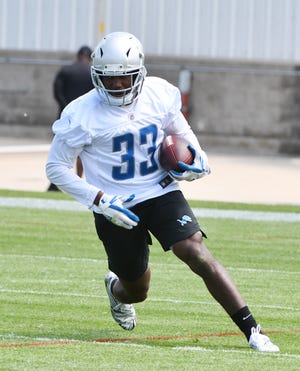Lions' new OC Darrell Bevell content to zig while NFL offenses zag
 Justin Rogers
Justin Rogers
Allen Park — For the past several years, the NFL has transformed into a pass-first league. That offensive shift hit a crescendo a Monday night last November, when the Los Angles Rams hosted the Kansas City Chiefs.
When the dust settled from the shootout, the Rams had held on for a 54-51 victory. It marked the first time a losing team scored 50 or more points. And whether you considered the game highly entertaining, or the lack of defense appalling, it epitomized the pass-happy nature of the league. The two teams combined for more than 1,000 yards of offense, but fewer than 200 came on the ground.
Coaches continue to talk about being balanced on offense, but the fact of the matter is only one team ran the ball as much as it passed it last season. A decade ago, seven ran the ball more.
The embracing of the pass is only growing. Two of the Rams' offensive assistants landed head coaching jobs this offseason. Matt Nagy, Kansas City's former offensive coordinator, was hired by Chicago a year earlier. Meanwhile, Bruce Arians was lured out of retirement by Tampa Bay and Arizona, Arians' former team, plucked Kliff Kingsbury and his Air Raid offense out of the college ranks.
The league is currently zagging a specific direction. The Detroit Lions, on the other hand, are content to zig.
In January, the team hired Darrell Bevell to coordinate the offense. And while he has worked with some great quarterbacks during his coaching career — namely Brett Favre and Russell Wilson — Bevell remains committed to running the ball and controlling the game.
"Yeah, I think the game has changed a lot, even since I've been in the NFL," Bevell said. "But it's kind of cyclical. You know? It kind of always comes back. I don't think there's necessarily any negative pushing against the grain sometimes — everybody starts doing one thing and they all kind of get good at running it or defending it."
There's no denying defenses have adjusted to the trends of offenses. Many teams have shifted to faster (and often smaller by default) linebackers who are better in coverage, and the nickel cornerback has essentially becoming a starting position with most teams playing with five or more defensive backs far more than a traditional base defense.
It logically follows that an offense built to run the ball should be more capable of physically dominating those smaller defensive looks.
"It is different for the opponent," Bevell said. "If you're playing the Rams and Chiefs, those teams, week in and week out, they're defending the same thing, and all of a sudden, you play us, there's going to be different things to defend. They have to decide how they want to do. They'll have to personnel it different. I think it gives you a little bit of an edge that way."

Bevell was raised on the run, playing quarterback at the University of Wisconsin. And he's had plenty of success maintaining that emphasis as a coach, building an offense that helped lead the Vikings to the NFC championship in 2008 and Seattle to back-to-back Super Bowl appearances in 2013 and 2014, including a 43-8 win over Denver in Super Bowl XLVIII.
The Lions are coming off their best season running the ball in several years, led by second-year star Kerryon Johnson. The team also added C.J. Anderson to the rotation as a free agent, bolstering a group that includes holdovers Zach Zenner and Theo Riddick.
But Bevell isn't ready to refer to his system as decidedly run-first. He prides himself on having the flexibility to adjust based on his personnel and what they do best, and the Lions happen to have a franchise quarterback in Matthew Stafford, a trio of talented receivers and a tight end selected in the first round of the most recent draft.
Ultimately, Bevell wants to build an offense that mirrors a core tenet of coach Matt Patricia's defense, multiplicity.
"We're just playing normal football, but we want to be tough, we want to be hard-nosed, we kind of want to be able to dictate the game," Bevell said. "We still want to have good tempo about us, we still want to be able to play quickly. There's a lot of great things that we can still do, but we also want to be multiple.
"I know if you asked defensive coordinators, if you just put one personnel on the field all day long, it's easier than it is if you're moving around personnel, changing people on the field, what they have to defend, how they want to defend it, how they want to match up, and it makes it more challenging for them during the week. So we want to be as multiple as we can be and use all our personnel."